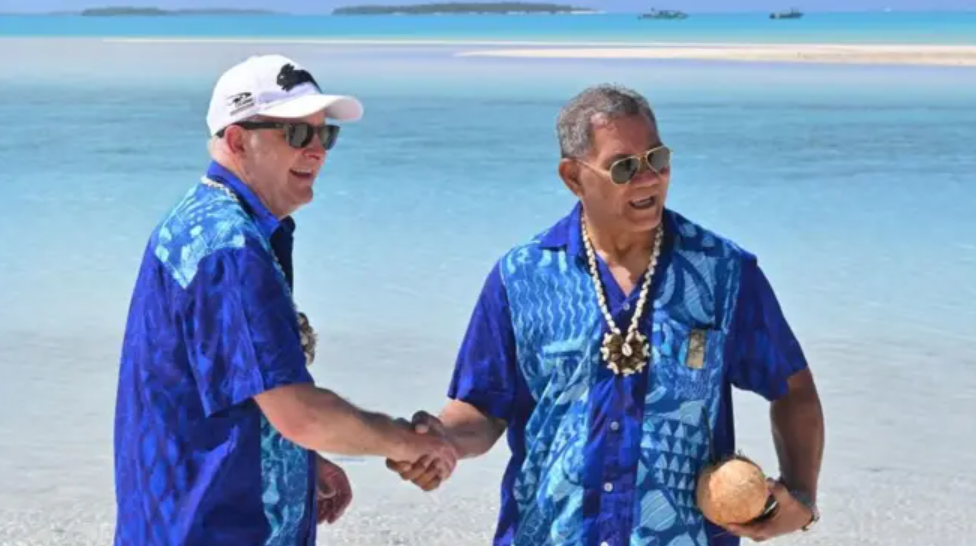Australia and Vanuatu have officially reached a historic 10-year agreement valued at $328 million USD, aiming to strengthen both security and economic ties between the two nations. Known as the Nakamal Agreement, this deal marks a significant milestone in Australia’s engagement with its Pacific neighbour, and could reshape the geopolitical landscape of the region.
The Australia Vanuatu Security Deal is the result of months of intensive negotiations between leaders from both countries. Speaking on Wednesday, Australian Deputy Prime Minister Richard Marles expressed the deep connection between the nations:
“We are family. Our future is very much bound together.”
Vanuatu’s Prime Minister Jotham Napat echoed the sentiment, describing the deal as a “win-win situation” for both countries.
The agreement is set to be officially signed in September and is widely seen as a strategic move by Australia to strengthen its influence in the Pacific, especially in response to China’s growing presence and investment in the region.

Key Highlights of the Australia Vanuatu Security Deal
While full details have yet to be released, reports from the Australian Broadcasting Corporation (ABC) reveal several major initiatives included in the agreement:
-
Construction of Two Major Data Centres
Australia will fund the building of two large-scale data centres, one in Port Vila, Vanuatu’s capital, and another on the nation’s largest island, Santo. These facilities aim to boost Vanuatu’s technological capacity and data security. -
Climate Change Support
As a low-lying island nation, Vanuatu is highly vulnerable to the impacts of climate change. Millions from the deal will be dedicated to helping the country adapt and strengthen climate resilience. -
Enhanced Security Measures
The agreement covers joint efforts to secure the region against evolving threats, ensuring both nations have a stable and safe environment. -
Labour Mobility and Economic Cooperation
While visa-free travel for Vanuatu citizens was initially discussed, it has been deferred to a “subsidiary agreement.” The deal will, however, include initiatives to boost labour mobility and provide financial support for economic transformation.
Why the Deal Matters
The Australia Vanuatu Security Deal is more than just an economic pact, it’s a strategic partnership. Australia has been actively pursuing stronger ties with Pacific nations, recently signing similar agreements with Tuvalu, Papua New Guinea, and the Solomon Islands.
In December last year, Canberra signed a $190 million security deal with the Solomon Islands, and now with Vanuatu on board, Australia is reinforcing a network of alliances in the Pacific.
This move comes amid growing competition in the region, particularly from China, which has been investing heavily in Pacific infrastructure and diplomatic relations.
A Deal Years in the Making
Negotiations for this deal have not been without challenges. A similar agreement in 2022 fell through when Vanuatu’s former Prime Minister pulled out at the last minute over security concerns.
However, with new leadership and renewed commitment, both nations have found common ground. Standing beside a volcano on Tanna Island during the announcement, Richard Marles spoke about the “shared destiny” of the two countries.
“[The deal] acknowledges that as neighbours, we have a shared security environment and a commitment to each other.”
Statements from Both Sides

Australian Foreign Minister Penny Wong highlighted the long-term vision of the agreement:
“The most important thing [about the deal] is where we will be in three, five, and ten years.”
Vanuatu’s Prime Minister Jotham Napat emphasised the broad benefits the partnership will bring, ranging from security cooperation to economic growth, with particular attention to mobile labour opportunities and financial assistance.
Strategic Implications in the Pacific
The Australia Vanuatu Security Deal is part of a wider pattern of strategic engagement. For Australia, maintaining influence in the Pacific is crucial to its national security and regional stability.
With the Pacific increasingly becoming an area of geopolitical competition, partnerships like this aim to ensure that Pacific nations maintain sovereignty, security, and economic independence.
Looking Ahead
The signing ceremony in September will mark the formal beginning of this partnership. While some details, such as visa-free travel, remain under discussion, the overall agreement is expected to bring significant benefits to both sides.
From data security infrastructure to climate change mitigation, the Australia Vanuatu Security Deal sets a precedent for collaborative development in the Pacific region.

